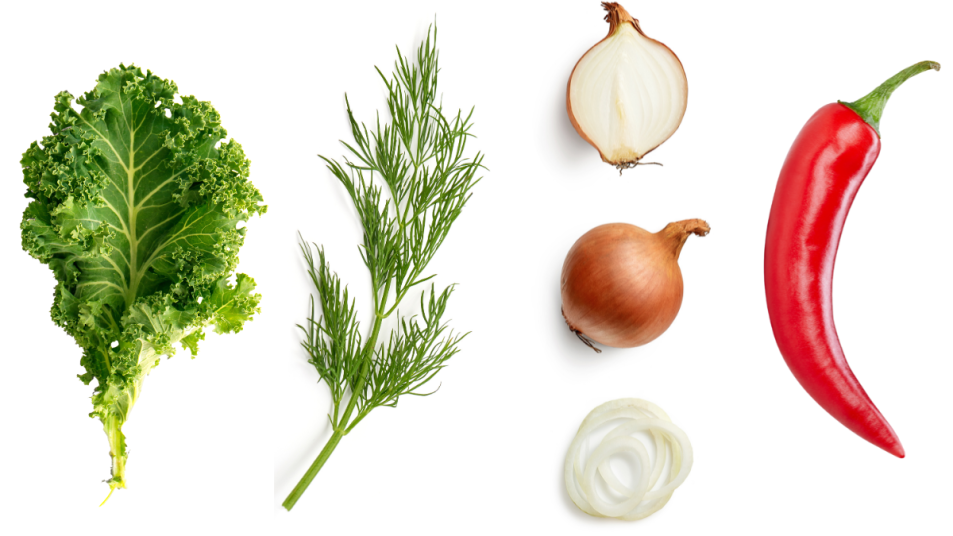Are You Eating Enough Flavonols? Your Memory Could Depend On Your Answer
Research suggests these plant compounds may slow down the rate of cognitive decline.

As you may know, diet has an impact on your cognitive health. Leafy greens, fatty fish, berries, tea, coffee, and certain nuts have all been linked to better brain health in a person’s later years. But are certain nutrients more important than others? All macro and micronutrients (macronutrients include carbs, fats, and protein; micronutrients include vitamins and minerals) play a key role in brain health. However, a recent study argues that flavonols are where you should focus your attention, because they may significantly slow down cognitive decline.
What are flavonols?
Flavonols are a class of flavonoids, which are compounds that naturally occur in plants. The molecular structure of a compound determines whether it is a flavonol or flavonoid. (So, you don’t need to worry about the distinction.) Flavonoids have anti-inflammatory and antioxidant properties, so there is a large body of research on the how these compounds benefit our health.
What happened in the study?
The study was conducted by researchers at the Rush University Medical Center in Chicago, and it was published in Neurology. Rush researchers wanted to determine whether the anti-inflammatory and antioxidant properties of flavonols truly have a positive effect on memory and overall cognition. So, they collected data from the Rush Memory and Aging Project, a long-term study that follows the health of Chicagoans living in community housing (such as an apartment complex or nursing home). The data came from 961 participants between 60 and 100 years old, none of whom had dementia, and all of whom answered a detailed food questionnaire. The researchers followed the participants for nearly seven years to observe the health effects of the participants’ diets.
Then, the Rush researchers adjusted the data to account for confounding variables. (A confounding variable is a factor that could influence the study’s findings and ruin the results. For instance: Smoking is a confounding variable. If a participant eats a diet low in flavonols but also smokes, she is likely to suffer from cognitive decline — mainly because of smoking, and not because of a low-flavonol diet.)
What were the study results?
Here’s what the Rush researchers found: People who ate the most flavonols experienced the slowest rate of cognitive decline per decade as compared to people who ate the lowest amount flavonols.
“It’s exciting that our study shows making specific diet choices may lead to a slower rate of cognitive decline,” said Thomas M. Holland, MD, MS, of Rush University Medical Center, in a press release. “Something as simple as eating more fruits and vegetables and drinking more tea is an easy way for people to take an active role in maintaining their brain health.”
Did the study have limitations?
As with any study, this research has its limitations. First, the Rush researchers used data from food questionnaires; there’s always a chance that participants’ responses to these questionnaires won’t be entirely accurate, so the authors couldn’t say that their data was precise. Second, the only participants were Chicagoans living in community housing. In effect, the study may have yielded different results if it included people across the US.
Which flavonols should you eat for better brain health?
In the study, the Rush researchers tracked four classes of flavonols: kaempferol, quercetin, myricetin, and isorhamnetin. If you can’t remember those names, don’t worry; all you have to remember are the foods with high levels of each flavonol. Check out the list of flavonol-rich foods below. For each category, the foods are in order of highest to lowest flavonol content.
- Kaempferol: Spinach, kale, dill, Chinese cabbage, chives, broccoli, fennel leaves, cherries, blueberries, asparagus, black tea
- Quercetin: Dill, fennel leaves, onions, oregano, chili pepper, fresh or frozen cranberries, spinach, kale, cherries, blueberries, lettuce, asparagus, broccoli, chives, black tea and Himalayan tartary buckwheat
- Myricetin: Cranberries, dock, sweet potato leaves, Swiss chard, rutabaga, garlic, blueberries, green and hot chili peppers, blackberries, lotus root, and lemon
- Isorhamnetin: Dill, parsley, green bell peppers, romaine lettuce, Chinese cabbage, and pears.
If you have a hard time keeping track of which flavonol-rich foods you eat in a day, focus on one general goal instead: Eat plenty of greens, fruits, and herbs daily, and you’ll be good to go.
This content is not a substitute for professional medical advice or diagnosis. Always consult your physician before pursuing any treatment plan.












